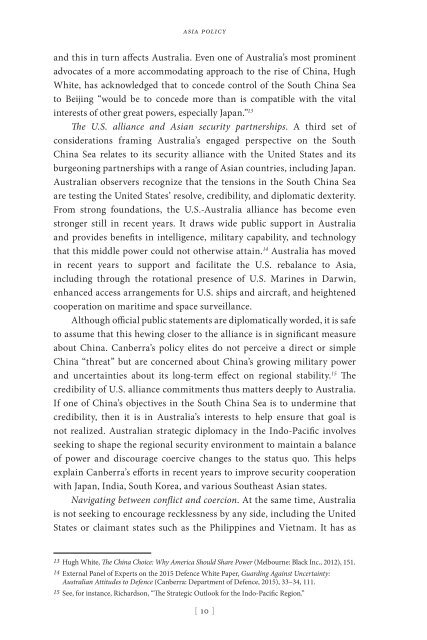Create successful ePaper yourself
Turn your PDF publications into a flip-book with our unique Google optimized e-Paper software.
asia policy<br />
and this in turn affects Australia. Even one of Australia’s most prominent<br />
advocates of a more accommodating approach to the rise of China, Hugh<br />
White, has acknowledged that to concede control of the South China Sea<br />
to Beijing “would be to concede more than is compatible with the vital<br />
interests of other great powers, especially Japan.” 13<br />
The U.S. alliance and Asian security partnerships. A third set of<br />
considerations framing Australia’s engaged perspective on the South<br />
China Sea relates to its security alliance with the United States and its<br />
burgeoning partnerships with a range of Asian countries, including Japan.<br />
Australian observers recognize that the tensions in the South China Sea<br />
are testing the United States’ resolve, credibility, and diplomatic dexterity.<br />
From strong foundations, the U.S.-Australia alliance has become even<br />
stronger still in recent years. It draws wide public support in Australia<br />
and provides benefits in intelligence, military capability, and technology<br />
that this middle power could not otherwise attain. 14 Australia has moved<br />
in recent years to support and facilitate the U.S. rebalance to Asia,<br />
including through the rotational presence of U.S. Marines in Darwin,<br />
enhanced access arrangements for U.S. ships and aircraft, and heightened<br />
cooperation on maritime and space surveillance.<br />
Although official public statements are diplomatically worded, it is safe<br />
to assume that this hewing closer to the alliance is in significant measure<br />
about China. Canberra’s policy elites do not perceive a direct or simple<br />
China “threat” but are concerned about China’s growing military power<br />
and uncertainties about its long-term effect on regional stability. 15 The<br />
credibility of U.S. alliance commitments thus matters deeply to Australia.<br />
If one of China’s objectives in the South China Sea is to undermine that<br />
credibility, then it is in Australia’s interests to help ensure that goal is<br />
not realized. Australian strategic diplomacy in the Indo-Pacific involves<br />
seeking to shape the regional security environment to maintain a balance<br />
of power and discourage coercive changes to the status quo. This helps<br />
explain Canberra’s efforts in recent years to improve security cooperation<br />
with Japan, India, South Korea, and various Southeast Asian states.<br />
Navigating between conflict and coercion. At the same time, Australia<br />
is not seeking to encourage recklessness by any side, including the United<br />
States or claimant states such as the Philippines and Vietnam. It has as<br />
13 Hugh White, The China Choice: Why America Should Share Power (Melbourne: Black Inc., 2012), 151.<br />
14 External Panel of Experts on the 2015 Defence White Paper, Guarding Against Uncertainty:<br />
Australian Attitudes to Defence (Canberra: Department of Defence, 2015), 33–34, 111.<br />
15 See, for instance, Richardson, “The Strategic Outlook for the Indo-Pacific Region.”<br />
[ 10 ]


